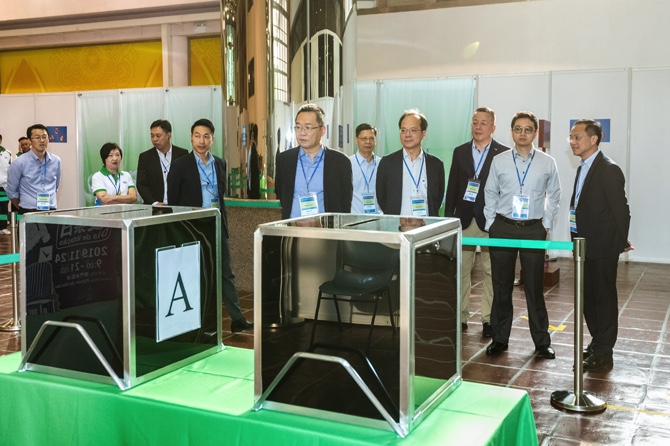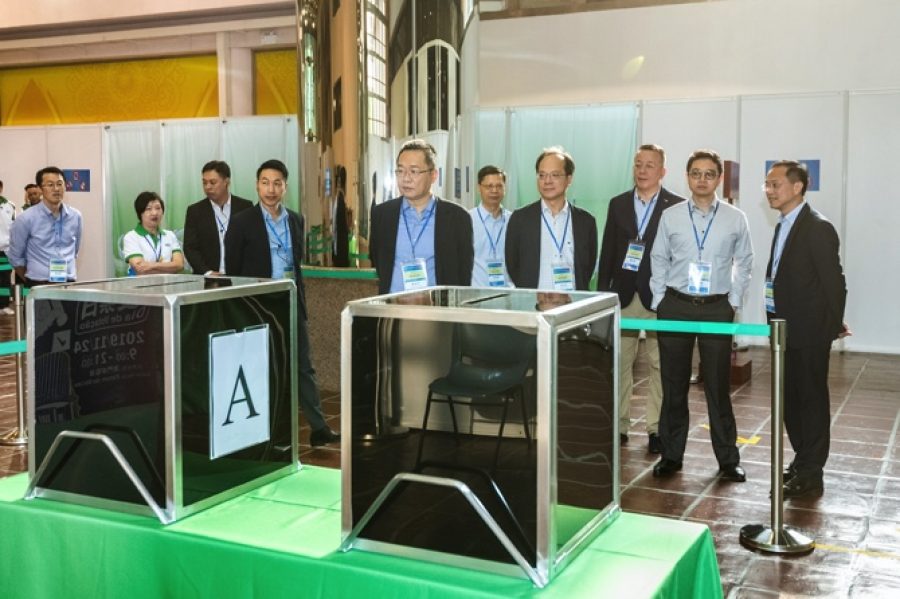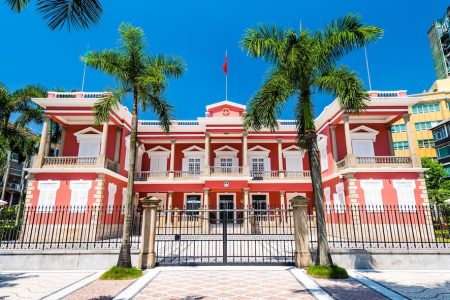The winner of Sunday’s by-election of a business sector seat in the Legislative Assembly (AL), Wang Sai Man, told reporters that as a lawmaker he will fight for a better business environment for local small- and medium-sized enterprises (SMEs).
Wang was the sole candidate. The 49-year-old businessman garnered 98.9 per cent of the votes cast.
Wang, a board member of the influential Macau Chamber of Commerce (ACM), spoke to reporters Sunday morning after casting his vote in the by-election at the Macau Forum polling station in Zape.
A total of 920 business sector voters had registered for Sunday’s ballot.


89.3 per cent turnout
Addressing a press briefing at the Public Administration Building in Rua do Campo last night, Legislative Assembly Electoral Affairs Commission Elections (CAEAL) President Tong Hio Fong said that 822 voters cast their ballots in the by-election, representing a voter turnout of 89.35 per cent.
Wang garnered 813 of the 822 votes cast, of 98.9 per cent, five of which were left blank and four were deemed invalid, according to Tong.
Voting took place from 9 a.m. to 9 p.m. at just one polling station – the Macau Forum complex.
Tong said that Sunday’s polling activity and vote counting were carried out “smoothly”.
The indirect election by the city’s business sector constituency was triggered by Ho Iat Seng’s resignation from the legislature on July 5. Ho is now Macau’s Chief Executive-designate. He is slated to be sworn in on December 20, when he will succeed Fernando Chui Sai On at the helm of the local government. Ho will be the Macau Special Administrative Region’s (MSAR) third chief executive and fifth-term chief executive, considering that his two predecessors – Edmund Ho Hau Wah and Chui – each served two consecutive five-year terms, the maximum allowed by the Macau Basic Law.
The 33-member legislature comprises 14 directly-elected seats, 12 indirectly-elected seats and seven government-appointed seats. Following Ho’s resignation earlier this year, the legislature currently has 32 members.
The legislature’s 12 indirectly-elected seats comprise four seats representing the city’s industrial, commercial and financial sector, three seats from the professional sector, two seats from the labour sector, two seats from the cultural and sports sector, and one seat from the social services and educational sector.
There was only one electoral group vying for the seat up for grabs in yesterday’s by-election – the Macau Business Interests Union formed by the Macau Chamber of Commerce (ACM), generally regarded as Macau’s most influential association.
Wang, a board member of the chamber, was the electoral group’s candidate. Wang is a member for the business sector on the Standing Council on Social Concerted Action, a government-appointed consultative body tasked with advising the government on its labour policies, which consists of five business sector representatives and five labour representatives, as well as a number of government officials.
Wang is also a vice-president of the Macau Industrial Association and the president of the Macau Textile Merchants Association.
The four candidates of the Macau Business Interests Union were elected uncontested in the Legislative Assembly’s indirect business sector election in 2017 – José Chui Sai Peng, Ip Sio Kai, Kou Hoi In, and Ho Iat Seng.
Wang is slated to be sworn in for his lawmaker position after yesterday’s by-election results have been officially confirmed and gazetted.
Speaking to reporters after casting his ballot, Wang said that as a lawmaker representing the city’s business sector, he would put special emphasis on business matters in the legislature while also paying close attention to other matters affecting civil society.
SMEs & economic diversification
Wang said that the sound running of SMEs in Macau was an important element to achieve Macau’s moderate economic diversification. He said that if the government could create a more propitious business environment for local SMEs, its aim of moderate economic diversification could be achieved more easily.
According to the Macau Post Daily, Wang also said that human resources problems and bureaucratic red tape are the two major issues making it difficult for SMEs to run their business, adding that therefore he will push the government to improve the situation concerning these two issues.
Sitting business sector lawmakers José Chui Sai Peng, Ip and Kou also talked to reporters after casting their votes. The trio said that they would work closely with Wang in the legislature to represent the business sector’s interests.






